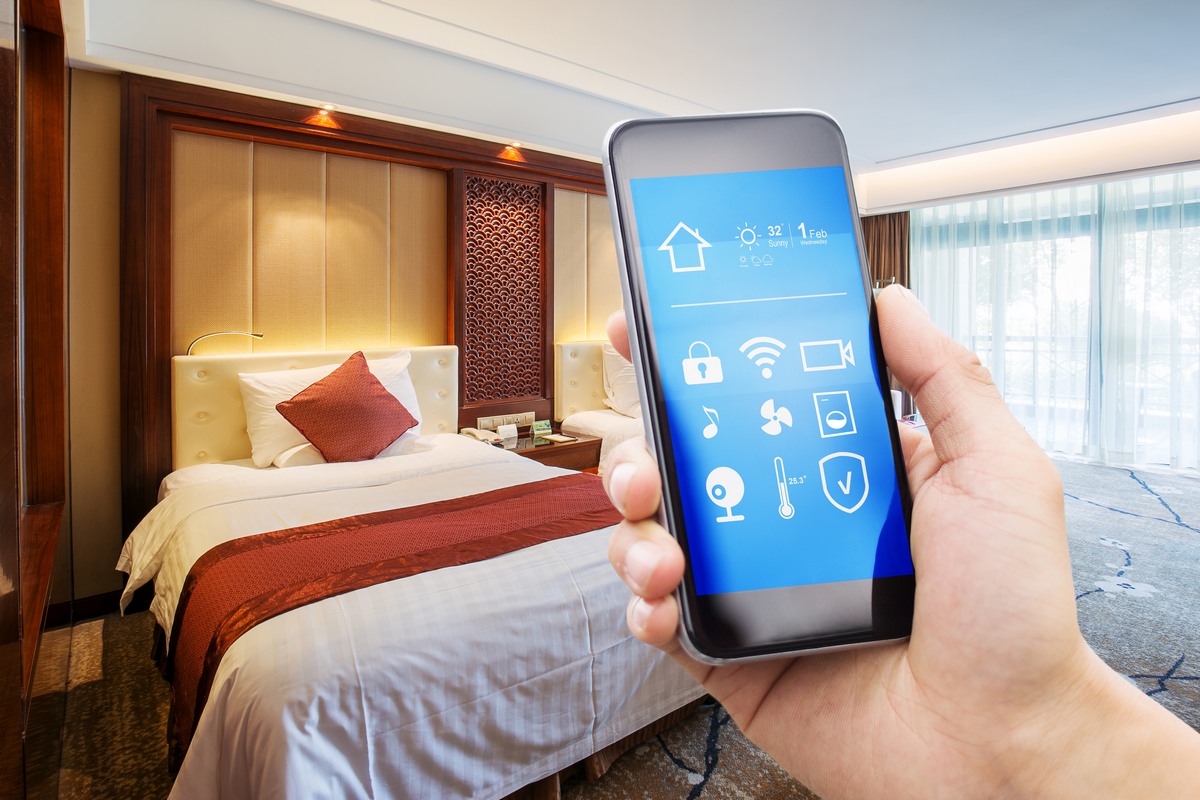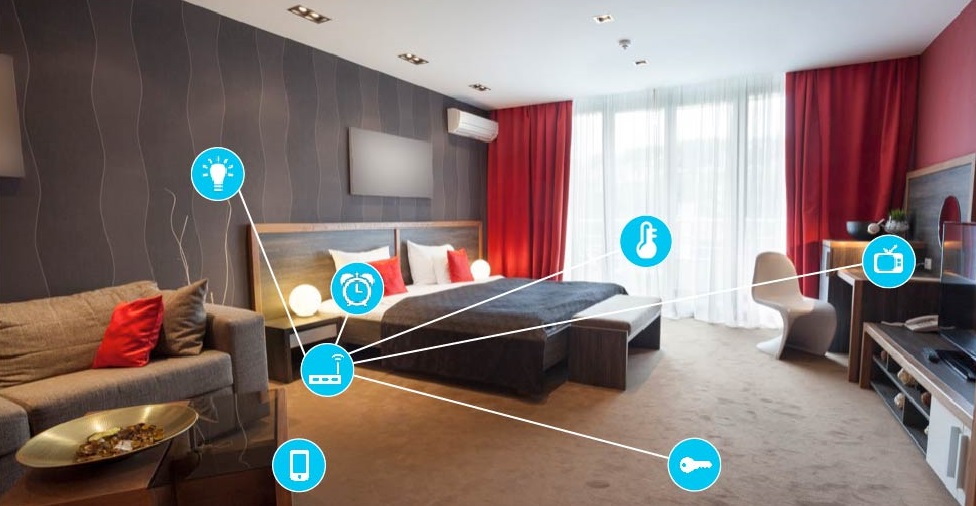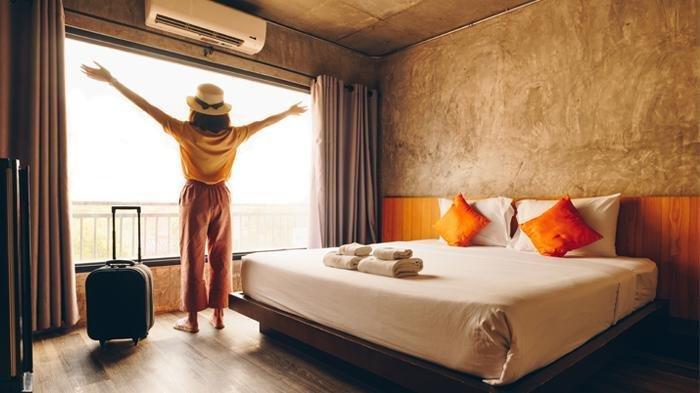The Core Concept

A smart hotel room transcends mere connectivity. It’s an integrated ecosystem where various devices and systems communicate to create a responsive, personalized, and efficient environment. This intelligence is designed to simplify the guest’s stay, enhance their comfort, and streamline hotel operations.
At its essence, a smart hotel room typically features:
A. Centralized Control System: A primary interface, often an in-room tablet or a guest’s smartphone app, that acts as a universal remote for all in-room functions. This eliminates the clutter of multiple remote controls and simplifies interaction.
B. Automated Climate Control: Sensors and smart thermostats that learn guest preferences or automatically adjust temperature based on occupancy, external weather conditions, or pre-set schedules, optimizing comfort and energy use.
C. Intelligent Lighting: Dimmable lights, customizable color temperatures, and automated lighting scenes that can be adjusted to mood (e.g., “relax,” “work,” “sleep”) or react to guest presence.
D. Integrated Entertainment: Smart TVs offering streaming services (Netflix, YouTube), casting capabilities from personal devices, and access to a curated content library, along with high-fidelity sound systems.
E. Motorized Curtains and Blinds: Automated control of window coverings for privacy, light management, and wake-up routines, often synchronized with alarm clocks or sunrise.
F. Voice Assistants: Integration with popular voice assistants (e.g., Amazon Alexa, Google Assistant) allowing guests to control room functions, request services, or get information using voice commands.
Why Smart Rooms Are Booming
The rapid proliferation of smart hotel rooms is fueled by a confluence of evolving guest expectations, technological advancements, and strategic business imperatives for hoteliers.
A. Evolving Guest Expectations
Modern travelers, particularly Millennials and Gen Z, are accustomed to smart technology in their homes and personal lives. They expect the same level of seamless connectivity, convenience, and personalization from their hotel stays. A smart room feels familiar and meets their tech-savvy lifestyle.
B. Demand for Personalization
Guests crave experiences tailored to their individual preferences. Smart rooms deliver this by allowing granular control over their environment, and by collecting data (with consent) that enables hotels to anticipate and cater to specific needs during current and future stays. This moves beyond generic service to truly bespoke comfort.
C. Enhanced Convenience and Seamlessness
The ability to control multiple room functions from a single device, or even by voice, significantly enhances convenience. Mobile check-in coupled with keyless entry bypasses front desk queues, saving valuable time and reducing friction, creating a more effortless arrival and departure experience.
D. Operational Efficiencies for Hoteliers
Smart rooms offer significant benefits to hotel management:
* Energy Savings: Automated lighting and climate control based on occupancy drastically reduce energy consumption and utility bills.
* Predictive Maintenance: IoT sensors can monitor equipment performance (e.g., HVAC units, mini-fridges) and alert staff to potential issues before they become costly breakdowns, minimizing guest disruption.
* Streamlined Housekeeping: Digital “Make-Up-Room” signals provide real-time status updates, optimizing housekeeping routes and efficiency.
* Data Insights: The data collected from smart rooms provides invaluable insights into guest preferences and usage patterns, informing future investments and service enhancements.
E. Competitive Differentiation
In a crowded hospitality market, offering cutting-edge smart room technology can be a powerful differentiator. It positions a hotel as innovative, modern, and forward-thinking, attracting tech-savvy travelers and enhancing brand image. This can lead to higher occupancy rates and premium pricing.
F. Health and Hygiene Focus
Post-pandemic, contactless technology has gained immense importance. Smart rooms facilitate touch-free interactions (e.g., voice control, mobile apps for service requests), enhancing perceived hygiene and safety for guests. Digital menus and virtual concierges also reduce physical touchpoints.
Key Technologies Powering Smart Hotel Rooms

The intelligence of these rooms is built upon a foundation of interconnected technologies that work in harmony.
A. Internet of Things (IoT)
IoT is the backbone of smart rooms. It refers to the network of physical objects embedded with sensors, software, and other technologies for the purpose of connecting and exchanging data with other devices and systems over the internet.
- Sensors: Occupancy sensors, temperature sensors, light sensors, humidity sensors – all collect data on the room environment and guest presence.
- Actuators: Devices that perform actions based on sensor data or commands (e.g., smart thermostats adjusting temperature, smart lights dimming).
- Connectivity: Wi-Fi, Bluetooth, Zigbee, Z-Wave, and other protocols that enable devices to communicate.
B. Artificial Intelligence (AI) and Machine Learning (ML)
AI and ML transform raw data from IoT sensors into actionable insights and intelligent automation.
- Predictive Analytics: AI learns guest patterns (e.g., when they typically leave the room, their preferred temperature range) to anticipate needs and proactively adjust settings.
- Voice Recognition: Powers voice assistants, allowing natural language commands for room control.
- Recommendation Engines: Can suggest tailored in-room entertainment or services based on guest behavior or expressed preferences.
- Anomaly Detection: ML algorithms can detect unusual energy consumption patterns or device malfunctions, flagging them for maintenance.
C. Cloud Computing
The cloud provides the scalable, secure infrastructure for processing and storing the vast amounts of data generated by smart rooms.
- Centralized Data Storage: Guest profiles, preferences, and usage data are securely stored and accessible across different hotel properties (for chains).
- Remote Management: Hotel staff can monitor and manage room systems remotely, addressing issues or pre-setting rooms before guest arrival.
- Scalability: Hotels can easily add or remove smart room features without needing extensive on-premise hardware upgrades.
- Integration Platform: The cloud acts as the central hub for integrating various smart room devices and hotel management systems (PMS, CRM).
D. Mobile Technology (Smartphones and Hotel Apps)
The guest’s smartphone is increasingly becoming the primary interface for their smart room experience.
- Dedicated Hotel Apps: Allow mobile check-in, keyless entry, in-room control, service requests, and digital concierge functions.
- Push Notifications: Deliver personalized alerts, promotions, or reminders directly to the guest’s phone.
- Seamless Integration: Guests can effortlessly switch between controlling the room with their phone and the in-room tablet.
E. Voice Control Platforms
Integration with established voice assistant platforms (Amazon Alexa for Hospitality, Google Assistant) or proprietary voice control systems allows intuitive, hands-free interaction with room features.
- Convenience: Guests can simply speak commands to adjust settings or request services.
- Accessibility: Offers an alternative control method for guests with mobility challenges.
- Novelty: Provides a modern, engaging element to the room.
Benefits of Smart Hotel Rooms
The advantages of implementing smart hotel room technology extend significantly to both the guest experience and hotel operations.
For Guests:
A. Unparalleled Comfort and Customization: Guests gain granular control over their environment, allowing them to personalize lighting, temperature, and entertainment precisely to their liking, creating a truly bespoke and comfortable stay.
B. Enhanced Convenience and Efficiency: Mobile check-in, keyless entry, and unified in-room controls save time, reduce friction points, and streamline interactions, making the entire stay feel effortless and seamless.
C. Improved Personalization: AI learns guest preferences, leading to tailored recommendations for services, dining, and activities, making guests feel valued and understood rather than just another visitor.
D. Faster and More Responsive Service: Digital concierge services and voice commands allow for quicker requests for room service, housekeeping, or information, with automated systems often fulfilling requests more rapidly.
E. Greater Sense of Control and Privacy: Guests control who enters their room (via digital DND), how their environment is set up, and how they interact with hotel services, empowering them with a heightened sense of autonomy and privacy.
For Hoteliers:
A. Significant Operational Efficiencies: Automation of routine tasks (check-in/out, DND signals, climate control) reduces staff workload, improves productivity, and allows human staff to focus on high-value guest interactions and complex problem-solving.
B. Substantial Energy Cost Reductions: IoT sensors and smart energy management systems optimize electricity consumption from lighting and HVAC when rooms are unoccupied or at specific times, leading to considerable savings on utility bills.
C. Data-Driven Insights and Strategic Decision Making: The rich data collected on guest preferences, usage patterns, and operational performance provides invaluable insights for optimizing services, personalizing marketing campaigns, forecasting demand, and making informed business decisions.
D. Enhanced Guest Satisfaction and Loyalty: A superior, personalized, and seamless experience leads to higher guest satisfaction scores, more positive online reviews, increased repeat bookings, and stronger brand loyalty.
E. Competitive Advantage and Brand Appeal: Offering state-of-the-art smart room technology differentiates a hotel in the market, attracting tech-savvy demographics and enhancing its image as innovative and forward-thinking, potentially allowing for premium pricing.
F. Predictive Maintenance and Reduced Downtime: IoT sensors enable proactive identification of equipment issues (e.g., a failing AC unit) before they lead to breakdowns, minimizing costly repairs, preventing guest discomfort, and ensuring maximum room availability.
Challenges and Considerations for Adoption
Despite the compelling benefits, the widespread adoption of smart hotel rooms faces several challenges that hoteliers must carefully navigate.
A. High Initial Investment Costs
Implementing comprehensive smart room technology, especially for an entire property, requires a significant upfront capital outlay for hardware (sensors, tablets, smart devices), software licenses, and integration services. This can be a major barrier for smaller or independent hotels.
B. Technical Integration Complexity
Integrating disparate smart room technologies with existing hotel management systems (Property Management Systems, CRM, POS, Building Management Systems) can be highly complex. Ensuring seamless communication and data flow between these varied platforms requires specialized IT expertise and can be prone to compatibility issues.
C. Data Privacy and Security Concerns
Smart rooms collect vast amounts of guest data, including preferences, usage patterns, and potentially even voice commands. This raises significant data privacy concerns. Hotels must implement robust cybersecurity measures, adhere strictly to global data protection regulations (e.g., GDPR, local Indonesian data laws), and be transparent with guests about data collection and usage to maintain trust. A data breach could be catastrophic for reputation.
D. Maintaining the Human Touch
While technology enhances efficiency, hospitality fundamentally remains a people-centric industry. The challenge is to strike the right balance between automation and preserving the genuine human connection, empathy, and personalized service that many guests still highly value. Technology should augment, not replace, meaningful staff interaction.
E. Rapid Technological Obsolescence
The pace of technological advancement is relentless. Systems and hardware installed today can become outdated within a few years. Hotels need to invest in flexible, adaptable, and modular smart room solutions that can be easily upgraded or replaced without requiring massive, costly overhauls.
F. Guest Adoption and Digital Divide
Not all guests are equally tech-savvy or willing to adopt new digital interfaces. Some may prefer traditional controls or human interaction. Hotels must ensure that smart room technology is intuitive and easy to use, and always provide traditional alternatives for those who prefer them, avoiding alienation of any guest segment.
The Future of Smart Hotel Rooms
The evolution of smart hotel rooms is set to accelerate, becoming even more integrated, intuitive, and anticipatory. The future promises a truly seamless and personalized living experience.
A. Hyper-Personalization Driven by Predictive AI: AI will become incredibly sophisticated, anticipating guest needs before they even arrive or express them. Based on pre-stay data, loyalty profiles, and even preferences inferred from social media (with consent), rooms will proactively adjust lighting schemes, preferred temperatures, background music, and even pre-stock mini-bars with favorite beverages, creating an environment that feels tailor-made from the moment of entry.
B. Integrated Wellness and Bio-Adaptive Environments: Smart rooms will evolve into wellness sanctuaries. This includes:
* Circadian Lighting: Dynamic lighting that adjusts color temperature and intensity throughout the day to support guests’ natural sleep-wake cycles.
* Sleep Optimization: Smart mattresses that monitor sleep patterns and adjust firmness, or subtle soundscapes for enhanced rest.
* Air Quality Management: Sensors actively monitoring and purifying air quality, adjusting humidity, and perhaps even infusing therapeutic scents.
* Guided Wellness: In-room screens or voice assistants offering personalized meditation, yoga, or stretching routines.
C. Seamless Biometric Authentication and Frictionless Flow: Beyond keyless entry, biometric authentication (facial recognition, fingerprint scans) could enable seamless access to all hotel amenities (gym, pool, spa, restaurants), secure payments, and even personalized greetings from staff, creating a truly effortless and secure guest journey across the entire property.
D. The “Invisible” User Interface: The reliance on tablets or apps for control will diminish as technology becomes more intuitive. Voice control will be standard, but gesture control, adaptive environmental responses (e.g., lights brighten as you approach a reading chair), and AI anticipating needs will make the technology virtually invisible, focusing solely on the enhanced experience.
E. Advanced Robotics and Autonomous Services: While human staff remain vital, robots will take on more diverse roles. This could include personalized delivery of more complex room service orders, autonomous cleaning of specific areas, or even in-room robotic assistants for basic queries or entertainment, working seamlessly with human teams.
F. Augmented Reality (AR) Enhanced Spaces: AR will transform the physical room. Guests could use AR apps on their phones to overlay information onto objects (e.g., history of a painting, instructions for an appliance), virtually redecorate the room, or experience interactive games and virtual tours directly within their physical space. Smart mirrors will become more common, offering virtual try-ons or interactive content.
Conclusion
The evolution of Smart Hotel Rooms is not merely a trend; it’s the inevitable trajectory of hospitality, driven by a profound desire for personalized convenience and operational excellence. From intelligent climate control that anticipates your arrival to voice-activated concierges fulfilling your every whim, these technologically advanced spaces are redefining what it means to be a welcoming host. While challenges regarding investment, privacy, and maintaining the vital human touch remain, the benefits of efficiency, enhanced guest satisfaction, and competitive differentiation are undeniable. As AI, IoT, and mobile innovations continue to mature and seamlessly integrate, the hotel room of tomorrow will be an intuitive, responsive sanctuary, anticipating needs and creating truly unforgettable stays. The era of intelligent comfort has definitively arrived.













